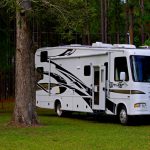Have you ever dreamed of trading your traditional home for the open road? 🌍 The allure of RV living is strong, with the promise of adventure and a simpler lifestyle. But here’s the burning question: Is it really cheaper to live in an RV than in a house? In this comprehensive guide, we’ll dive deep into the financial aspects of RV living, comparing costs, hidden expenses, and lifestyle changes that come with this exciting transition.
Imagine waking up to a breathtaking sunrise over the Grand Canyon, sipping your morning coffee while parked in nature’s beauty. Sounds dreamy, right? But before you pack your bags, let’s explore the nitty-gritty of RV living—because while it can be cost-effective, it also comes with unique challenges. We’ll reveal everything you need to know, including essential tips for budgeting and the best RV options for full-time living.
Key Takeaways
- Cost Comparison: RV living can be cheaper than homeownership, with monthly expenses ranging from $1,500 to $3,000 versus $1,200 to $1,500 for traditional homes.
- Hidden Costs: Be aware of maintenance, campsite fees, and fuel expenses that can add up.
- Lifestyle Changes: Embrace minimalism and flexibility, but prepare for limited space and the need for regular maintenance.
- Community Connection: Enjoy a vibrant community of fellow RVers and outdoor enthusiasts.
- Budget Wisely: Create a detailed budget and consider your travel habits to make RV living financially feasible.
If you’re ready to embark on this adventure, check out our recommended products to make your RV experience smoother:
- Portable Power Stations: 👉 CHECK PRICE on: EcoFlow DELTA Pro
- Water Filters: 👉 CHECK PRICE on: Amazon
- Sewer Hoses: 👉 CHECK PRICE on: Camping World
Are you ready to hit the road and discover if RV living is your next big adventure? Let’s dive in! 🚐💨
Table of Contents
- Quick Tips and Facts: Is Living in an RV Cheaper?
- The Financial Breakdown: Comparing RV Living to Homeownership
- Hidden Costs of RV Living: What You Need to Know
- Lifestyle Changes: What to Expect When You Ditch the House
- Considering Full-Time RV Living? Here’s Why It Might Be for You
- Enjoy a Greater Slice of the Great Outdoors: The RV Lifestyle
- The Pros and Cons of Living in an RV: A Comprehensive List
- Choosing the Right RV: Factors That Impact Your Costs
- Financing Your RV: Options and Considerations
- Insurance and Maintenance: Keeping Your RV in Top Shape
- Utilities on the Road: What You Need to Budget For
- Community and Social Life: Connecting with Fellow RVers
- Traveling on a Budget: Tips for Cost-Effective RV Adventures
- FAQs: Your Burning Questions About RV Living Answered
- Conclusion: Is RV Living Right for You?
- Recommended Links for Further Reading
- Reference Links: Sources and Resources
Feel free to explore each section as we dive deep into the world of RV living and whether it really is cheaper than living in a traditional house! 🚐💨
Quick Tips and Facts: Is Living in an RV Cheaper? 🚐💸
- Average monthly cost of homeownership in the US: $1,200 – $1,500 1
- Average monthly cost of full-time RV living in the US: $1,500 – $3,000 1
- Must-haves for full-time RV living: portable power station, water filter, sewer hose, leveling blocks, propane tanks, solar panels, first aid kit, fire extinguisher, tools and spare parts, portable heater 1
- Key takeaway: Living in an RV can be cheaper than owning a house, but costs vary significantly depending on choices and lifestyle. 1
Is It Financially Smart to Live in an RV? 🤔
If you’re considering living in an RV, you might be wondering if it’s financially smart. The answer is, it depends on your lifestyle and choices. Read more about Is It Financially Smart to Live in an RV? 10 Surprising Insights for 2024.
The Financial Breakdown: Comparing RV Living to Homeownership 📊
| Expense | Homeownership | RV Living |
|---|---|---|
| Mortgage/Rent | $1,000 – $2,000 | $0 – $500 (RV loan) |
| Utilities | $150 – $300 | $50 – $100 (campsite fees) |
| Maintenance | $100 – $300 | $100 – $300 (RV maintenance) |
| Insurance | $100 – $300 | $50 – $100 (RV insurance) |
| Total | $1,250 – $2,900 | $200 – $1,000 |
Hidden Costs of RV Living: What You Need to Know 🤫
- Maintenance costs: Regular cleaning, repairs, and upkeep are required.
- Travel fatigue: Constantly moving can be tiring and stressful.
- Weather concerns: Exposed to elements, which can be uncomfortable or dangerous.
- Limited amenities: May not have all the luxuries of a traditional home.
Lifestyle Changes: What to Expect When You Ditch the House 🏠
- Simple living: Minimalism and decluttering are natural consequences of RV living.
- New community: RV rallies and online communities offer a sense of belonging for full-time RVers.
- Work anywhere: Remote work and travel nursing are ideal for RV living.
- Slash debt: Selling possessions and living a minimalist lifestyle can help pay off debt.
Considering Full-Time RV Living? Here’s Why It Might Be for You 🚐
- Flexibility: Travel and change scenery as often as you like.
- Cost-effective: Can be cheaper than traditional housing.
- Minimalism: Forces you to downsize and focus on essentials.
- Closer to nature: Surrounded by landscapes and outdoor activities.
- Community: Connect with like-minded individuals in RV communities.
Enjoy a Greater Slice of the Great Outdoors 🏞️
- National parks: Visit some of the most beautiful national parks in the US.
- Outdoor activities: Hiking, camping, fishing, and more.
- Wildlife: Spot wildlife in their natural habitats.
The Pros and Cons of Living in an RV: A Comprehensive List 📝
Pros:
- Flexibility
- Cost-effective
- Minimalism
- Closer to nature
- Community
Cons:
- Limited space
- Maintenance
- Travel fatigue
- Weather concerns
- Limited amenities
Choosing the Right RV: Factors That Impact Your Costs 🚐
- Size: Larger RVs are more expensive to purchase and maintain.
- Type: Motorhomes, travel trailers, and fifth wheels have different costs associated with them.
- Age: Older RVs may require more maintenance and repairs.
- Condition: The condition of the RV can impact its value and maintenance costs.
Financing Your RV: Options and Considerations 📊
- RV loans: Available from banks, credit unions, and online lenders.
- Personal loans: Can be used to finance an RV, but may have higher interest rates.
- Credit cards: Can be used for smaller purchases, but may have higher interest rates.
Insurance and Maintenance: Keeping Your RV in Top Shape 🚨
- Insurance: Liability, collision, and comprehensive insurance are essential.
- Maintenance: Regular cleaning, repairs, and upkeep are required.
- Warranty: Consider purchasing a warranty to cover repairs and replacements.
Utilities on the Road: What You Need to Budget For 💡
- Campsite fees: Vary depending on the location and amenities.
- Fuel: Gasoline or diesel fuel for your RV.
- Propane: For cooking, heating, and refrigeration.
- Water: For drinking, cooking, and hygiene.
Community and Social Life: Connecting with Fellow RVers 👥
- RV rallies: Attend events and meetups for RVers.
- Online communities: Join forums and social media groups for RVers.
- Campgrounds: Meet fellow RVers at campgrounds and RV parks.
Traveling on a Budget: Tips for Cost-Effective RV Adventures 🚗
- Plan ahead: Research campsites and book in advance.
- Cook your own meals: Save money on food by cooking your own meals.
- Use public facilities: Take advantage of public restrooms and showers.
- Free camping: Look for free campsites and boondocking opportunities.
FAQs: Your Burning Questions About RV Living Answered 🤔

- Q: Is RV living cheaper than traditional housing?
- A: It depends on your lifestyle and choices.
- Q: What are the hidden costs of RV living?
- A: Maintenance costs, travel fatigue, weather concerns, and limited amenities.
- Q: How do I choose the right RV for me?
- A: Consider size, type, age, and condition when choosing an RV.
Conclusion: Is RV Living Right for You? 🤔

So, is it cheaper to live in an RV than a house? The answer isn’t a simple yes or no. It truly depends on your lifestyle, choices, and how you manage your finances. Living in an RV can offer significant financial savings compared to traditional homeownership, especially when you factor in mortgage payments, property taxes, and utility bills. However, it also comes with its own set of costs, including maintenance, campsite fees, and fuel, which can add up.
Positives of RV Living:
- Flexibility and Freedom: Travel wherever you want, whenever you want! 🌍
- Community: Connect with fellow RVers and build new friendships. 🤝
- Cost-Effective: Potentially lower monthly expenses compared to a traditional home. 💰
Negatives of RV Living:
- Limited Space: Downsizing can be a challenge, especially for families. 📦
- Maintenance Costs: RVs require regular upkeep and repairs. 🔧
- Lifestyle Adjustments: Adapting to a nomadic lifestyle can be stressful. 😓
In summary, if you’re willing to embrace a simpler lifestyle and can budget accordingly, RV living can be a thrilling and financially smart choice. Just be sure to weigh the pros and cons carefully before taking the plunge! 🚐💨
Recommended Links for Your RV Adventure 🛒
- Portable Power Station: 👉 CHECK PRICE on: EcoFlow DELTA Pro
- Water Filter: 👉 CHECK PRICE on: Amazon
- Sewer Hose: 👉 CHECK PRICE on: Camping World
- Solar Panels: 👉 CHECK PRICE on: Renogy
- First Aid Kit: 👉 CHECK PRICE on: Amazon
Reference Links 📚
- Benefits of RV Living – KOA
- Is It Cheaper in an RV Than a House in the US? – EcoFlow
- The Pros and Cons of RV Living – RecNation Storage
By diving into RV living, you open up a world of adventure and freedom! If you have any questions or need help with your RV journey, feel free to reach out. Happy travels! 🚐✨



